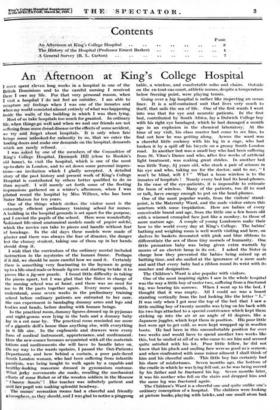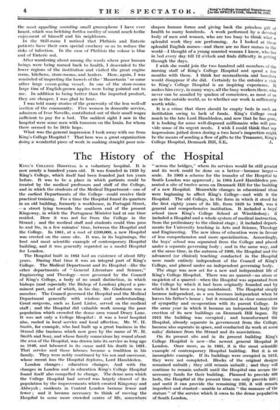An Afternoon at King's College Hospital I ONCE spent eleven
long_ weeks in a hospital in one of the British Dominions and to the careful, nursing I received there owe my life. For that very. personal reason, when / visit a hospital ir do-hot feel- an -outaider. I am able to recapture my feelings when I was one of the inmates and when my world consisted almost entirely of what washappening inside the walls of the building in which I was then lying. • Most of us take hospitals too much for granted. In ordinarylife, when things go well and when we -and our friends are not suffering from some dread disease or the effects.of some accident, we try and forget about hoipitals. It- is only when fate brings some .imlOoked-tor caiamiti.to us, that we enter the healing doors and make our demands On the hOspitalidemands which are rarely refused.
I was asked by one of the members of- the Committee Of King's College Hospital, Denmark Hill jelose to Ruskin's old home), to visit the hospital, which is one of the most 'up-to-date in London, and to set down some personal impres- Sions—an invitation which I gladly accepted. A detailed story of the past history and present work of King's College Hospital is contributed by others better qualified to do so 'than myself. I will merely set forth some of the fleeting impressions gathered on a winter's afternoon, when I was piloted round the hospital by Miss Willcox, who has been 'Sister Matron for ten years.
One of the things which strikes the visitor most is the extremely efficient preliminary training schoOl for nurses. A building in the hospital grounds is set apart for the purpose, and I envied the pupils of the school. Here were wonderfully fashioned life-sized anatomical models made of papier nulehe, 'which the novice can take to pieces and handle without fear of breakage. In the old days these models were made of plaster and there was always the fear of disaster, the danger lest the clumsy student, taking one of them up in her hands should drop it.
I wish that the curriculum of the ordinary mortal included instruction in the mysteries of the human frame. Perhaps if it did, we should be more careful how we used it. Certainly there is something very fascinating to the layman in going 'tip to a life-sized male or female fig tire and starting to take it to 'pieces like a jig-saw puzzle. I found little difficulty in taking the pieces apart, but I was glad that the Sister in charge of the nursing school was at hand, and there was no need for "me to fit the parts together again. Every nurse spends, I understand, some seven weeks in the preliminary training school before ordinary patients are entrusted to her care. She can experiment in bandagIng dummy arms and legs and -bodies and heads, before dealing with human beings.
' In the practical room, dummy figures dressed up in pyjamas and night-gowns were lying in the beds and a dummy baby
• lay in a cot near by. The practical room reminded me more . of a gigantic doll's house than anything else, with everything in it life size. ' In the cupboards and drawers were every :form of medical instrument, appurtenance, and medicament. :Here the new-comer becomes acquainted with all the materials :lotions and medicaments she will have to handle later on. On my way to the wards upstairs, I passed the Out-Patients . Department, and here behind a curtain, a poor pale-faced South London woman, who had been suffering from infantile paralyiis, was being taught to walk again by a capable and healthy-looking masseuse dressed in gymnasium costume. What jerky movements she made, recalling. the mechanical :efforts of some Robot or Of the wooden soldiers in the Moscow ." Chauve Souris- ! Her teacher was infinitely patient and said her pupil was making splendid headway.
The nurses' recreation rooms had a cheerful and friendly atmosphere, as they should, and I was glad to notice a pingpong table, a wireless, and comfortable sofas and chairs. Outside on the en-tout-cas court, athletic nurses, despite a temperature below freezing point, were playing tennis. Going over a big hospital is rather like inspecting an ocean liner. It is a self-contained unit that lives very much to itself, that sails the sea of life. One of the first wards I went into was that for eye and neurotic patients. In the first
bed, contributed by South Africa, lay a Dulwich College boy with his right eye bandaged, which he had damaged's month ago in an explosion in the chemical laboratory. At the time of my visit, his class master had come to see, him, to find out how he was getting along. Across the ward was a cheerful little cockney with his leg in a cage, who had broken it by a spill off his bicycle on a greasy South London road. In another bed was a small -boy who had been suffering from St. Vitus's Dance and who, after five weeks of artificial light treatment, was making great strides. In another bed was little Tony, 5f years old, who stuck a pair of scissors in his eye and who, taking me for the doctor,' said to me, " I won't be blind, will I ? " What a boon wireless is to the inmates of ho-spitals ! Nearly every bed had its head-phones. In the 'case of the eye-patients, it is impossible to estimate the boon of wireless. Many of the patients, too ill to read or talk, have energy enough to put on the head-phones.
One of the most popular wards, from the visitors' stand- point, is the Maternity Ward, and the male visitor enters this sanctum with some trepidation. Here are babies of every conceivable brand and age, from the little one a few hours old with a wizened crumpled face just like a monkey, to those of more mature age. A couple of young Londoners make their bow to the world every day at King's College. The babies' bathing and weighing room is well worth visiting and here, on shelves lie baskets decorated with pink and blue ribbons to differentiate the sex of these tiny morsels of humanity. One little preMature baby was being given extra warmth by means of an electric lamp in its cot. I asked the Sister in charge how tbey prevented the babies being mixed up at bathing time, and she smiled at the ignorance of a mere male and said that every baby had a ribbon round its wrist with its number and designation.
The Children's Ward is also popular with visitors.
One of the most inspiring sights I saw in the whole hospital was the way a little boy of under two, suffering from a fractured leg, was bearing his sorrows. When I went up to the bed, I thought that it was empty. All I could see was a board standing vertically from the bed looking like the letter " L." It was only when I got near the top of the bed that I saw a little smiling boy of twenty months was lying on his back with his two legs attached to a special contrivance which kept them sticking up into the air at an angle of 45 degrees, like a Japanese juggler, which kept them in position. His poor little feet were apt to get cold, so were kept wrapped up in woollen boots. He had been in this uncomfortable position for over two weeks and would have to spend another two weeks like this, but he smiled at all of us who came to see him and seemed quite satisfied with his lot. Poor little fella*, he' did not know that his pluck and smiling face were as good as a sermon, and when' confronted with some minor ailment I shall think of him and his cheerful smile. This little boy has certainly had his share of misfortunes. Seven 'months ago, the bottom of the cradle in which he was lying fell out, as he was being moved by his father and he fractured his leg. Seven months later, it was his mother who fell on the stairs and dropped him and the same leg was fractured again.
The Children's Ward is a cheerful one and quite unlike one's ordinary conception of a hospital. The children were looking at picture books, playing with bricks, and one small atom had the most appalling sounding small gramophone I have ever heard, which was belching forth a medley of sound much to the enjoyment of himself and his neighbours.
In the Still-room I noticed that Phthisis and Enteric patients have their own special crockery so as to reduce the risks of infection. In the case of Phthisis the colour is blue and of Enteric red.
After wandering about among the wards where poor human beings were being nursed back to health, I descended to the lower regions of the institution and visited the great engine room, kitchens, 'store-rooms, and larders. Here, again, I was reminded of inspecting the bowels of the Mauretania ' or some other large ocean-going vessel. In one of the store-rooms large tins of English-grown apples were being pointed out to Me. In addition to being better than the imported product, they are cheaper, I was glad to hear.
I was told many stories of the generosity of the less well-off section of the community. Five women in domestic service, admirers of Ivor Novella, contributed out of their small wages Sufficient to pay for a bed. The saddest sight I saw in the hospital were some men with tumours on the brain. for whom there seemed to be little hope.
What was the general impression I took away with me from King's College Hospital ? That here was a great organization doing a wonderful piece of work in making straight poor mis- shapen human forms and giving back the priceless gift of health to many hundreds. A work performed by a devoted body of men and women, who are too busy to think what a splendid work they are performing. As I looked at these splendid English nurses—and there are no finer nurses in the world—I thought of a young married woman I know, who lies in bed every day till 12 o'clock and finds difficulty in getting through the days.
I wish she could join the two hundred odd members of the nursing staff of King's College Hospital and spend a few months with them. I think her neurasthenia and boredom would disappear if she did. Certainly to the outsider a visit to King's College Hospital is an inspiring experience. It makes him envy, in many ways, all the busy workers there, who never can be assailed by qualms of conscience, as most of us are in the outside world, as to whether our work is sufficiently worth while.
It is a crime that there should be empty beds in such an institution owing to lack of funds. King's College owed much to the late Lord Hambleden, and now that he has gone, it is looking for some well-disposed millionaire who will pro- vide some of its urgent needs. I wish I could think that my impressions jotted down during a two hour's inspection might be the means of sending a flow of gifts to the Treasurer, King's College Hospital, Denmark Hill, S.E. J.



















































 Previous page
Previous page